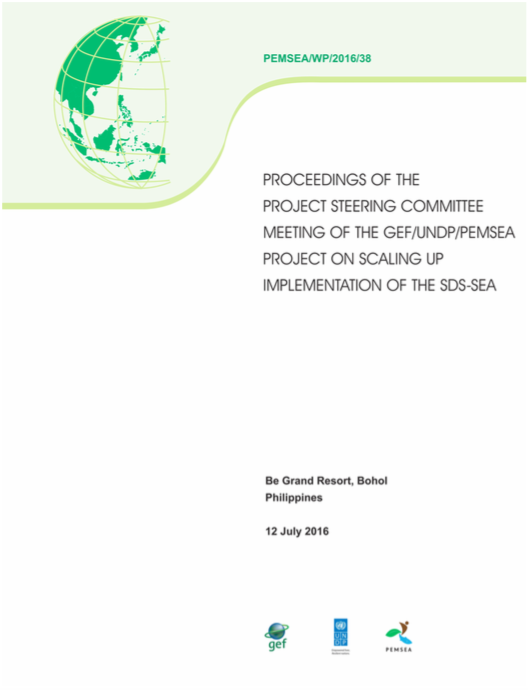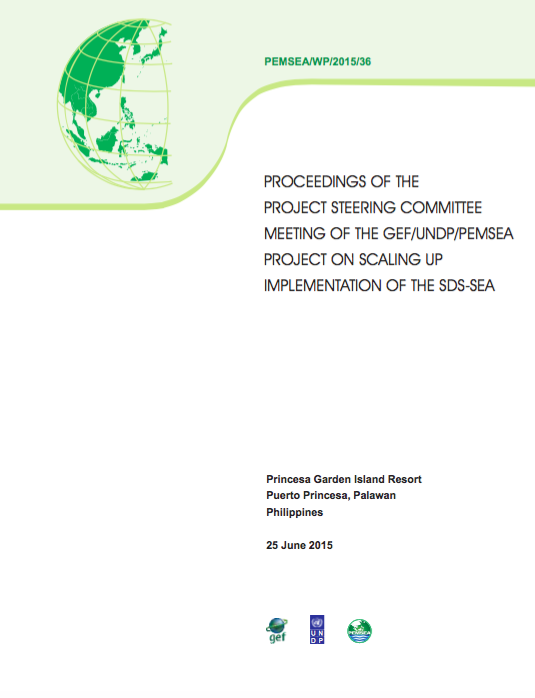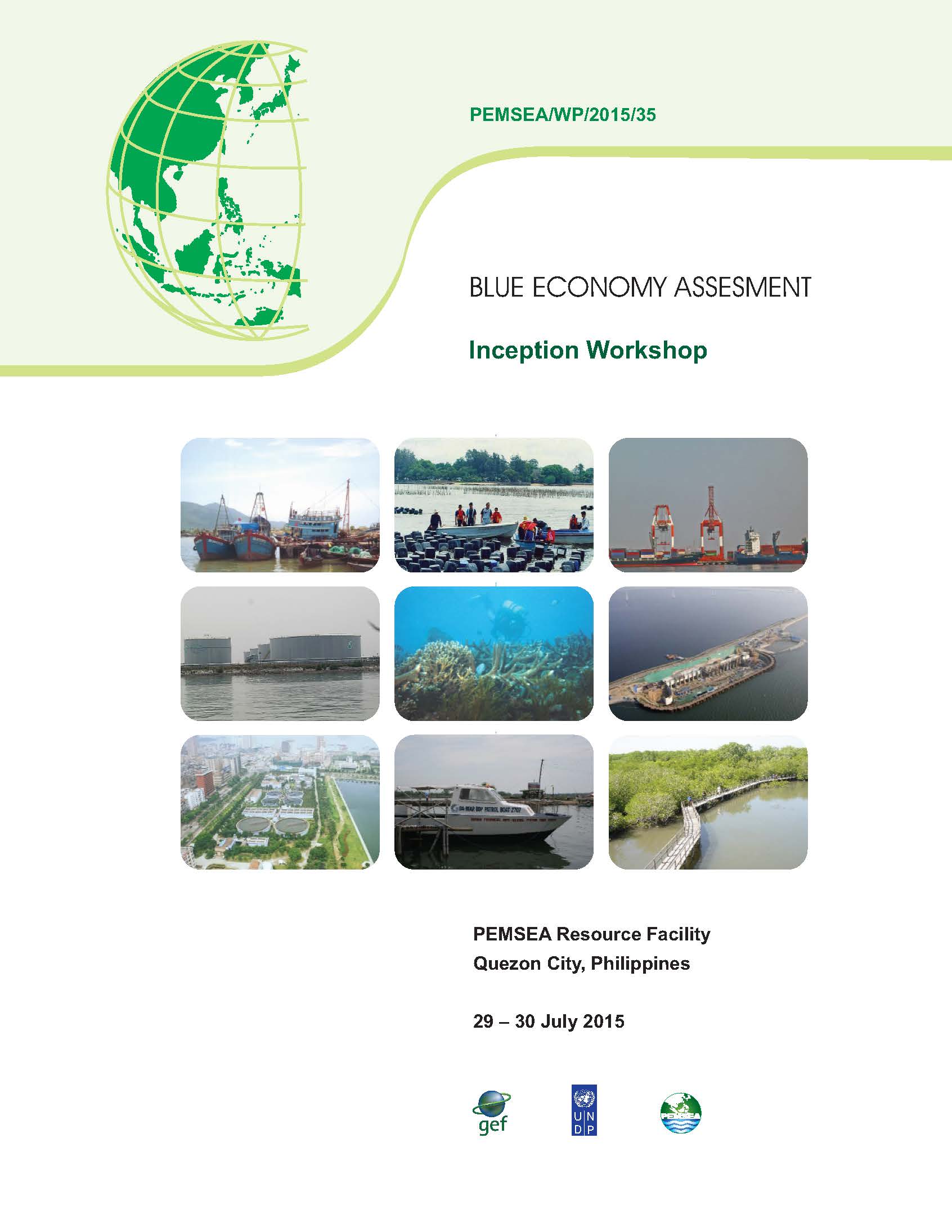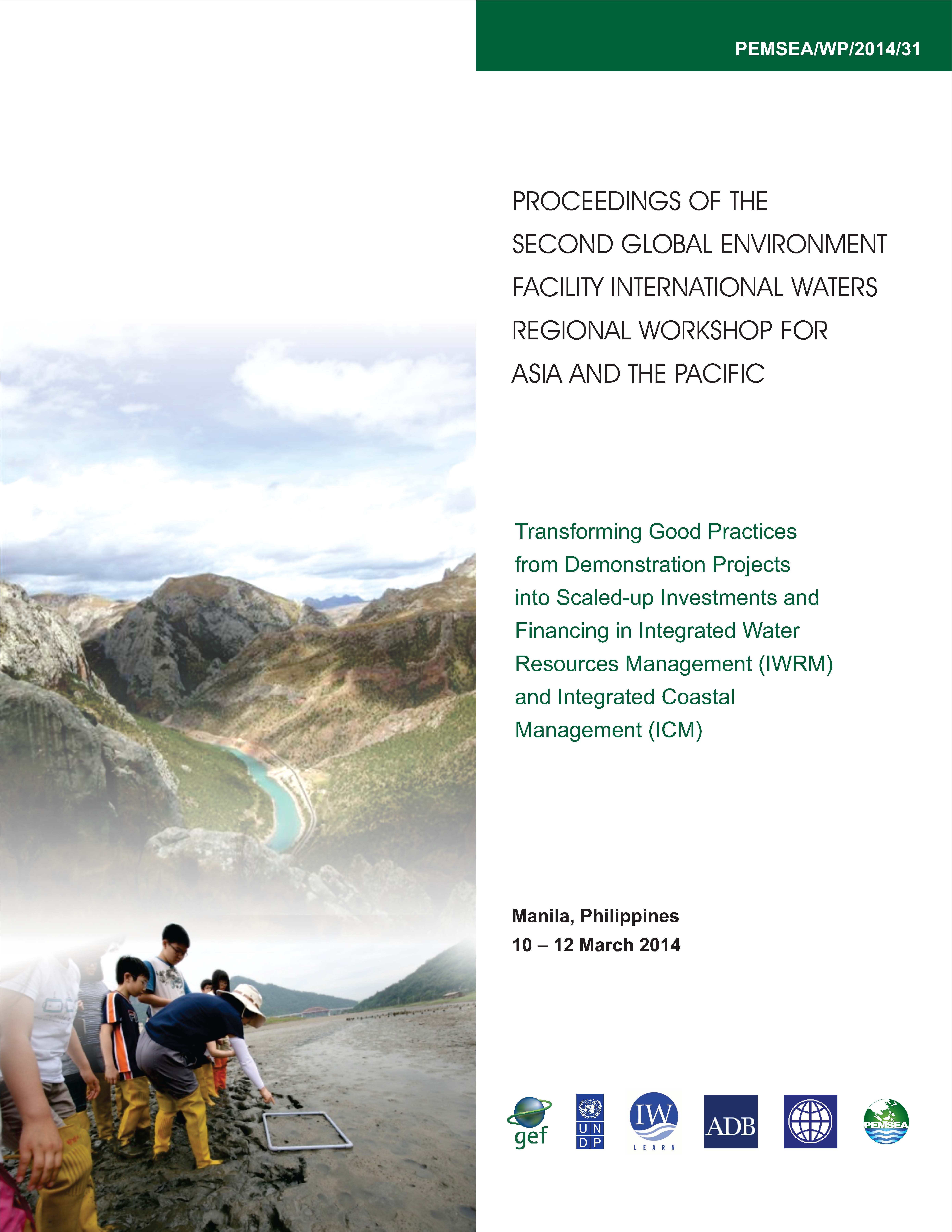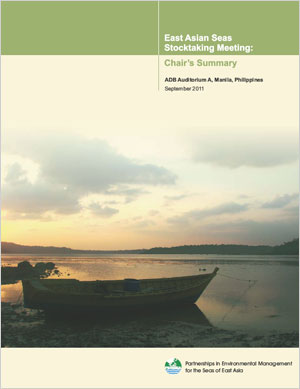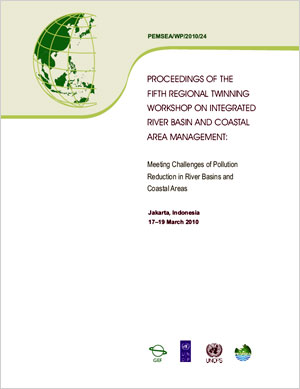
Breadcrumb
Proceedings of the Project Steering Committee Meeting of the GEF/UNDP/PEMSEA Project on Scaling Up Implementation of the SDS-SEA (July 2016)
The Project Steering Committee Meeting of the GEF/UNDP/PEMSEA Project on Scaling up SDS-SEA Implementation was held at the Be Grand Resort, Panglao Island, Bohol, Philippines on 12 July 2016. The Department of Environment and Natural Resources (DENR) of the Philippines hosted the Meeting. The Meeting was attended by representatives from eight project participating countries, namely: Cambodia, China, Indonesia, Lao PDR, Philippines, Thailand, Timor-Leste and Vietnam. Three PEMSEA partner countries were present as observers and/or as contributing countries to PEMSEA: Japan, RO Korea, and Singapore. Representatives from the United Nations Development Programme (UNDP) Manila and the UNDP Regional Hub Bangkok were present on behalf of the Global Environment Facility and UNDP. The PEMSEA Resource Facility (PRF) served as the Secretariat for the Meeting. This publication summarizes the proceedings of the meeting.
DOCUMENT TITLE
China Report
Cambodia Report
Timore Leste Report
Laos Progress Report
Indonesia Report
Thailand Report
Vietnam Report
Philippines Progress Report
China Work Plan and Budget
SDS-SEA Work Plan and Budget
Proceedings of the Project Steering Committee Meeting on Scaling Up of the SDS-SEA
The Project Steering Committee Meeting of the GEF/UNDP/PEMSEA Project on scaling up implementation of the SDS-SEA was held at the Princesa Garden Island Resort, Puerto Princesa, Palawan, Philippines on 25 June 2015. The Department of Environment and Natural Resources (DENR) of the Philippines hosted the Meeting. The Meeting was attended by representatives from six project participating countries, namely: Cambodia, China, Lao PDR, Philippines, Timor-Leste and Vietnam. Three PEMSEA partner countries were present as observers and/or as contributing countries to PEMSEA: DPR Korea, Japan, and RO Korea. Representatives from the United Nations Development Programme (UNDP) Manila and the UNDP Regional Hub Bangkok were present representing the Global Environment Facility and UNDP. A representative from The World Bank was also present as an observer. The PEMSEA Resource Facility (PRF) served as the Secretariat for the Meeting.
The PSC Meeting focused on the status of the project MOA signing in countries, the regional and country work plans and budget for 2015-2016, and actions to be taken to address the gaps.
Proceedings of the Blue Economy Assessment Inception Workshop
The Inception Workshop on Blue Economy Assessment was held on 28-30 July 2015 at the PEMSEA Building in the Department of Environment and Natural Resources (DENR) Compound in Quezon City, Philippines.
Representatives from seven countries in the East Asian Seas (EAS) region participated, and presented ongoing efforts on blue economy in their respective countries. Group exercises focused on identifying key ocean economic activities and investment opportunities, and examining issues related to data availability and accessibility.
Experts on ocean economy, economic and environment accounting, and valuation of ecosystems and biodiversity were invited as resource persons. They also provided important insights during the discussions.
Based on the definition of blue economy (from the Changwon Declaration 2012), agreement was reached on ways to move forward with the assessment of ocean economy and innovative investments for blue economy development.
World Bank/GEF/PEMSEA Medium-Sized Project Applying Knowledge Management to Scale up Partnership Investments for Sustainable Development of Large Marine Ecosystems of East Asia and their Coasts
The GEF-supported World Bank medium-sized project (MSP) on Applying Knowledge Management to Scale up Partnership Investments for Sustainable Development of Large Marine Ecosystems of East Asia and their Coasts primarily aims to enhance the capacity and performance of investments in the sustainable development of large marine ecosystems (LMEs) and coasts in the East Asian Seas (EAS) region through knowledge and experience sharing, portfolio learning and networking. The MSP addresses the need for the conversion and integration of new information and knowledge into innovative policies and development programs, scaling up and replicating initiatives, and increased commitments of resources and new investments by the public and private sectors. The project will facilitate interaction among policymakers, implementers, networks and investors, as well as address gaps in necessary skills and services to move from policy and planning into actions and investments through intergovernmental arrangements and communities of practice at the regional, national and local levels. The MSP is funded by the Global Environment Facility (GEF) and executed by the Partnerships in Environmental Management for the Seas of East Asia (PEMSEA) under the supervision of the World Bank (WB) and in coordination with countries and other partners. The Project Inception Workshop aimed to discuss and build consensus on: Priority knowledge management (KM) products and services that would support scaling up and replication of good practices and investments among the projects under the WB/GEF Program Framework, targeting both public and private investors; The processes involved in applying the knowledge products and services (KPS) in relation to the proposed framework for scaling up investments and partnerships in support of sustainable development and management of coastal and marine ecosystem services; The schedule of activities, outputs and events of the KM project that would align with and support the planned activities and outputs of the investment and learning projects; and The coordinating and implementing arrangements between the KM project and the investment and learning projects.
Proceedings of the 2nd Global Environment Facility (GEF) International Waters (IW) Regional Workshop for Asia and the Pacific
Transforming Good Practices from Demonstration Projects into Scaled-Up Investments and Financing in Integrated Water Resources Management (IWRM) and Integrated Coastal Management (ICM) The Second Global Environment Facility (GEF) International Waters (IW) Regional Workshop for Asia and the Pacific was held from 10–12 March 2014 at the Asian Development Bank (ADB) and Crowne Plaza Hotel, Manila, Philippines. The regional workshop was organized by the GEF International Waters: Learning Exchange and Resource Network (IW: LEARN) in collaboration with ADB, World Bank (WB) and Partnerships in Environmental Management for the Seas of East Asia (PEMSEA). The workshop aimed to strengthen the performance of GEF IW projects through: (a) facilitating and promoting good policies and practices; and (b) leveraging increased investments in habitat conservation, nutrient reduction and water resource use. Specifically, the workshop aimed to: (a) review case studies and good practices in the development, facilitation and implementation of investment projects addressing issues under the blue (ecosystem) and brown (pollution) sectors; (b) share knowledge and experience on key aspects of scaling up and replication of good practices and lessons learned from demonstration projects; and (c) explore advances in knowledge harvesting tools and indicators, as well as in developing knowledge services and products that strengthen ownership and commitment among policymakers and investors in scaling up and replication of good practices.
Background Paper for the East Asian Seas Stocktaking Meeting: Preparation of a Programmatic Approach for the Coordinated Sound Management and Development of the East Asia Seas Region
The Seas of East Asia (EAS) are bordered by China, Japan and the Korean Peninsula in the north and the Southeast Asian nations in the south. The region harbours a significant part of the world’s coral reefs and mangroves and also produces about 40 percent of the world’s fish catch and more than 80 percent of aquaculture. The human pressure on marine and coastal resources is very high with approximately 2 billion people living in the region. The EAS region encompasses a series of large marine ecosystems (LME), subregional seas and their coastal areas. This includes the Yellow Sea, the East China Sea, the South China Sea, Gulf of Thailand, the Sulu-Celebes Sea and the Indonesian Seas — six LMEs of great ecological and economic importance. The physical extent of each LME and its boundaries are based on four linked ecological, rather than political or economic, criteria: (1) bathymetry; (2) hydrography; (3) productivity; and (4) trophic relationships. Globally, the LMEs are centers of coastal ocean pollution and nutrient over-enrichment, habitat degradation (e.g., seagrasses, corals, and mangroves), overfishing, biodiversity loss, and climate change effects. This report is taking stock of results of GEF projects in these LMEs, including overlaps with two LMEs bordering Australia. Yellow Sea (LME #48) East China Sea (LME #47) South China Sea (LME #36) Gulf of Thailand (LME #35) Sulu-Celebes (Sulawesi) Sea (LME #37) Indonesian Sea (LME #38) North Australian Shelf (Arafura Sea, Gulf of Carpentaria) (LME #39) Northwest Australian Shelf (Timor Sea) (LME #45) The countries that border these LMEs are: Australia; Brunei; Cambodia; China; DPR Korea; Indonesia; Japan; Malaysia; Philippines; RO Korea; Singapore; Thailand; Timor-Leste; and Viet Nam.
East Asian Seas Stocktaking Meeting: Chair's Summary
The East Asian Seas Stocktaking Meeting was held at the Asian Development Bank (ADB) Auditorium A, Manila, Philippines from 28-29 October 2010. The ADB and Government of the Philippines through the Department of Environment and Natural Resources hosted the meeting. The objective of the meeting was to assess the status and identify the constraints to sustainable management of the regional seas, and to prioritize the interventions and the potential role of the GEF over the next 4 years (i.e., 2011 to 2014). The Stocktaking Meeting concluded the following: The Stocktaking Background Paper was well received and considered to be a good and useful document in the context of the stocktaking effort. It will undergo refinement based on inputs provided during the meeting. The refined paper will then be disseminated to GEF agencies, GEF Secretariat, participating countries and concerned regional organizations. Country ownership and country-drivenness to address transboundary issues in the Seas of East Asia have developed and strengthened over the years with GEF support, as evidenced by the development and adoption of the SDS-SEA and the YSLME and SCSLME SAPs with their associated national action plans as well as by the implementation of the pollution reduction investment fund. PEMSEA and the SDS-SEA, respectively, can provide a regional governance mechanism, framework and scope for integrated and collaborative planning, coordination, and monitoring and reporting of outputs and impacts of regional, subregional and national projects for sustainable management of the seas of East Asia, as well as to promote knowledge management and associated good practices. There are recognized needs for increased programmatic GEF investments in the EAS region according to a programmatic agenda covering: Knowledge-sharing, advocacy, communication, development and dissemination and good practices, and capacity development/training, awareness building and education; Thematic priorities including: the blue agenda with marine and coastal habitat and resource conservation and management (with an increase attention to fisheries resources); and the brown agenda: land-based sources of marine pollution. In addition, climate change adaptation is a cross-cutting priority to be mainstreamed in the two above thematic priorities. Scaling up of investments at the local and national levels in support of capital works identified and developed in coastal areas in the context of ICM, when possible, through linkages with the public and private sectors, using domestic and international finance; A shift from projects that have a planning focus to projects that promote good practices, implement agreed plans and result in desired on-the-ground changes. A programmatic agenda to scale up entails: Working across sectors and in several countries; Mobilizing resources programmatically within and across different sources of finance and different sectors; and Making effective and efficient use of available human and financial resources by increasing synergy and alignment. GEF agencies now need to work with countries to develop the regional and national projects using a programmatic approach for submission to GEF in order to support the regional implementation of SDS-SEA (final phase), the YSLME SAP and the SCSLME SAP as well as to scale up country-based actions along the lines of the identified thematic priorities.
Proceedings of the Sixth Twinning Workshop on Integrated River Basin and Coastal Area Management (IRBCAM): Total Allowable Pollutant Load Allocation in River Basins and Coastal Areas of East Asia
The theme of the Sixth Twinning Workshop on Integrated River Basin and Coastal Area Management (IRBCAM) was "Total Allowable Pollutant Load Allocation in River Basins and Coastal Areas of East Asia." This publication summarizes the outcome of the workshop. The theme of the Sixth Twinning Workshop on Integrated River Basin and Coastal Area Management (IRBCAM) was "Total Allowable Pollutant Load Allocation in River Basins and Coastal Areas of East Asia." It aimed to share good practices and experiences in planning, implementing and evaluating total allowable pollutant reduction programs in integrated river basin and coastal area management programs of Bohai Sea (PR China), Manila Bay (Philippines), Jakarta Bay (Indonesia), Jiulong River (PR China) and Masan-Chinhae Bay (RO Korea). The workshop was held at the Xinghai Golf Hotel, Dalian, PR China, from 18–20 May 2011. The workshop was co-organized by the State Oceanic Administration (PR China); Ministry of Land, Transport and Maritime Affairs (RO Korea); Korea Maritime Institute (RO Korea) and PEMSEA. The Workshop included participants from Democratic People's Republic of Korea, Indonesia, Japan, People's Republic of China, Philippines, and the Republic of Korea.
Proceedings of the Fifth Regional Twinning Workshop on Integrated River Basin and Coastal Area Management: Meeting Challenges of Pollution in River Basins and Coastal Areas
The 5th Regional Twinning Workshop on Integrated River Basin and Coastal Area Management (IRBCAM) with the theme "Meeting Challenges of Pollution Reduction in River Basins and Coastal Areas" was held at the Ibis Hotel, Jakarta, Indonesia, from 17 to 19 March 2010. The workshop was co-organized by Partnerships in Environmental Management for the Seas of East Asia (PEMSEA), PEMSEA Twinning Secretariat/Korea Maritime Institute (KMI), Ministry of Land, Transport and Maritime Affairs (MLTM) of Republic of Korea (RO Korea) and Ministry of Environment (MOE) of Indonesia. The participants were largely officials from the national and local government levels of Indonesia. The resource persons for the workshop were from various organizations and agencies from Indonesia, Philippines, RO Korea, the United States of America (USA), international and national nongovernmental organizations (NGOs), the private sector and donor agencies, including, the World Bank and Japan International Cooperation Agency (JICA). The workshop aimed to share experiences, good practices and lessons learned in planning, developing and implementing pollution reduction investments in Manila Bay (Philippines) and Jakarta Bay (Indonesia) within the context of IRBCAM.
